Download PDF
WHAT’S HAPPENING
Ophthalmology’s New Editor-in-Chief: Dr. McLeod
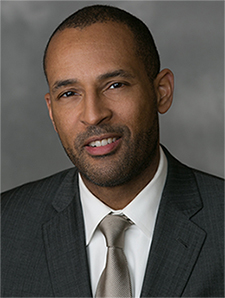
Dr. McLeod
As of Jan. 1, 2017, Ophthalmology has a new Editor-in-Chief: Stephen D. McLeod, MD, who succeeds George A. Bartley, MD. Dr. McLeod is chair of the ophthalmology department at the University of California in San Francisco, and recently served as the Academy’s secretary for Quality of Care. Dr. McLeod earned a medical degree at Johns Hopkins University School of Medicine in Baltimore. After finishing an ophthalmology residency at the Illinois Eye and Ear Infirmary at the University of Illinois, Chicago, he completed fellowship training in cornea, external disease, and refractive surgery at the University of Southern California’s Doheny Eye Institute.
Dr. McLeod brings extensive publishing experience to Ophthalmology, having served for 20 years on the editorial board and as associate editor for the American Medical Association’s journal for ophthalmology research, Archives of Ophthalmology, and on the editorial board of its successor, JAMA Ophthalmology. He was also on the editorial board for the Journal of Refractive Surgery. Dr. McLeod has authored more than 100 articles in the peer-reviewed literature.
“Stephen McLeod is a tremendous clinician-scientist, with a deep personal commitment to the critical role of our profession’s flagship journal in helping to frame and address the most important issues of our time,” said David W. Parke II, MD, Academy CEO. “Dr. McLeod is a respected leader of one of our country’s most distinguished academic departments. I’m sure he will bring that same energy, integrity, and commitment to excellence to Ophthalmology.”
TAKE NOTICE
PQRS—Jan. 15 Deadline for IRIS Registry Users
If you have been using the IRIS Registry to take part in the 2016 Physician Quality Reporting System (PQRS), Jan. 15 is an important deadline on 2 counts: The first applies to all IRIS Registry participants, and the second just to those who are manually entering PQRS data into the Web portal.
- Submit a signed data-release consent form for each of your practice’s providers. The IRIS Registry won’t submit a provider’s PQRS data to the Centers for Medicare & Medicaid Services unless it has received the signed consent form by Jan. 15. This consent deadline applies whether you signed up for manual PQRS reporting or for automated data extraction from your electronic health records. You must submit a new consent each year. For instructions, visit aao.org/iris-registry/news/article/how-to-sign-data-release-consent-form.
- Enter all of your PQRS data. If you signed up for manual PQRS reporting, you must enter all your 2016 data into the Web portal by Jan. 15.
Avoid the PQRS penalty. If you don’t report PQRS successfully, you will be subject to financial penalties under both the PQRS and the Value-Based Modifier programs.
For more information, visit aao.org/irisregistry and aao.org/pqrs.
Subscribe to the Brand-New Ophthalmology Retina
The Academy’s Ophthalmology Retina is a new peer-reviewed journal focused exclusively on the latest advances in retina. During 2017, Ophthalmology Retina will be issued bimonthly, after which it will be issued monthly. Academy members: subscribe for $299/12 issues at aao.org/store. Nonmembers: subscribe for $350/12 issues at aao.org/retinajournal.
Orbital Gala Raises More Than $190,000 for Academy Programs
More than 400 guests donned their favorite animal print for a “Walk on the Wild Side” at the 13th annual Orbital Gala on Oct. 16 at the Field Museum. The Academy Foundation fundraiser honored former EyeNet Chief Medical Editor Richard P. Mills, MD, MPH, for more than 30 years of service to the Academy. The silent auction, open for the first time to all U.S. members, was the most successful to date, generating bidding wars on ophthalmic equipment, sports tickets, jewelry, wine, and spirits. Guests also enjoyed cocktails, a buffet dinner, the museum’s exhibits, photos with Sue the T. rex, and dancing.
Special thanks to event chairs Drs. Williams and Gieser (pictured below) and their committee: Dr. Morse (pictured below), Chris Albanis, MD, Kathryn A. Colby, MD, PhD, Mary Lou Lunde, William F. Mieler, MD, Joseph T. Nezgoda, MD, MBA, Purnima S. Patel, MD, Ron Pelton, MD, PhD, Peter A. Quiros, MD, John R. Stechschulte, MD, Prem S. Subramanian, MD, PhD, and Dalel Tartak, MD.
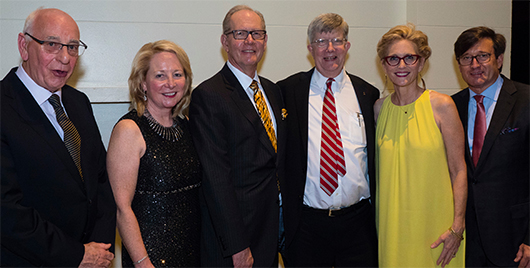 |
|
ORBITAL GALA HONOREE. Dr. Mills was honored for having served the Academy for more than 30 years. From left to right: Tony McClellan, Foundation Advisory Board president; Christie L. Morse, MD, Foundation Advisory Board chair; David W. Parke II, MD, Academy CEO; Richard P. Mills, MD, MPH, the Foundation’s 2016 honoree; and Ruth D. Williams, MD, and Stephen C. Gieser, MD, MPH, Orbital Gala chairs.
|
FOR THE RECORD
Nominations for the Academy Board
By William L. Rich III, MD, FACS
As past president of the Academy, I am privileged to serve as chairman of the Academy’s Nominating Committee in 2017. This committee represents a variety of interests within the Academy and is charged with identifying appropriate candidates for the open positions on the 2018 Board of Trustees.
We are interested in identifying leaders in our profession with experience in confronting the critical issues facing organized medicine and who reflect the strength and diversity of our members. The Academy’s leaders should be knowledgeable, experienced, and prepared to devote the time and energy required by a large organization in these challenging times. This work is both demanding and rewarding for those interested in helping to assure the Academy’s success and responsiveness to members. With these characteristics in mind, I ask you to assist the committee by suggesting appropriate candidates for the following positions in 2018.
President-Elect (to serve as president in 2019). Nominees should have leadership experience within the Academy as well as demonstrated leadership qualities in clinical practice, in their own ophthalmic communities, and in other medical or ophthalmological organizations.
Senior Secretary for Advocacy (3-year term). This senior secretary coordinates the programs and activities that are developed through the Secretariat for Federal Affairs and the Secretariat for State Affairs. Daniel J. Briceland, MD, is serving the final year of his first term in this position and is eligible for a second term.
Trustee-at-Large (4-year term). This individual should be an Academy fellow who demonstrates strong leadership potential and would be able to represent and articulate the needs and concerns of the membership to the Academy board.
International Trustee-at-Large (3-year appointment). This individual should be an Academy international fellow or member who practices exclusively outside of the United States. He or she should have a strong affinity for the Academy and broad experience and understanding of his or her region. This individual should be able to represent and articulate to the Academy board the perspective of international members.
Public Trustee (a renewable 3-year appointment). The bylaws allow the board to appoint up to 3 public trustees. We currently are served by Humphrey J.F. Taylor and Paul B. Ginsburg, PhD. Mr. Taylor will complete his 8th term in 2017. Public trustees provide insight on how ophthalmology can better work with the rest of medicine, the public, government, and industry. The nominating committee will be pleased to receive suggestions for individuals, who may include physicians from other medical specialties or leaders in industry, government, public policy, or advocacy.
Thank you for your interest and participation in this process. Membership participation is vital, not only for the Academy but also for our collective goals of being able to provide appropriate, accessible, and affordable eye care to the public. On behalf of the Nominating Committee, I look forward to receiving your suggestions as we seek to identify our profession’s future leaders.
Send your confidential suggestions by Jan. 31 to William L. Rich III, MD, FACS; Nominating Committee Chair, American Academy of Ophthalmology, P.O. Box 7424, San Francisco, CA 94120-7424. Suggestions can also be emailed to nominate@aao.org or faxed to 415-561-8526.
For more information, visit aao.org/about/governance/board-nominations.
About the Nominating Committee
The Academy nominating process has been carefully crafted to be inclusive, fair, and efficient. This process encourages a broad base of nominations from the entire Academy membership. The Nominating Committee composition is delineated by the bylaws, and it considers a number of factors when screening potential candidates. These include integrity, ophthalmology leadership ability, special expertise, past committee and leadership experience and performance, and knowledge and interest in the multitude of issues currently facing ophthalmology. In addition to nominations from the current year, the committee reviews prior year nominations to ensure a wide range of potential candidates for each position. Following months of confidential deliberations, the committee presents final recommendations to the Board of Trustees for approval. This single-candidate method avoids the loss of valuable future leaders as there are no public “losers” in the election. Often, those considered but not selected for an open position one year become the nominee of choice in a future year.
|
MEMBERS AT LARGE
Michigan Society’s Focus on the Future
On Oct. 27 in Detroit, the Michigan Society of Eye Physicians and Surgeons’ (MiSEPS) Young Ophthalmologist Section (YOS) sponsored an event in which experts discussed topics that are especially important for physicians as they start their career. These topics included how to deal with their first employment contract after residency, pearls for first-time home buyers, tips on consolidating debt, and key factors for success for wealth management. “This was a great opportunity for YOs to hear a fast-paced program on important topics followed by networking with speakers and peers,” said Michael J. Siegel, MD, MiSEPS YOS Chair.
Dr. Siegel, in collaboration with Gregory J. Chancey, MBA, MiSEPS executive vice president and chief operating officer, has continued a tradition of offering a number of events in which YOs gather and share ideas. Activities have included residency alumni days; educational conferences; Detroit Tigers, Lions, and Red Wings games; Grand Prix racing; and Riverfront concert cruises. Brad H. Feldman, MD, Academy secretary for Member Services, said, “We applaud MiSEPS and other state ophthalmology societies—such as those in Florida, Georgia, and New York—that have mirrored the Academy’s emphasis on the YO and have made concerted efforts to provide value to them.”
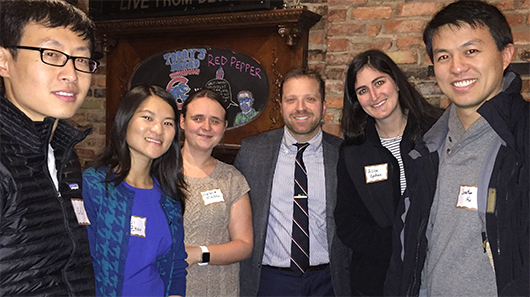 |
|
MICHIGAN EVENT. Michael J. Siegel, MD, MiSEPS YOS chair, joins young ophthalmologists at the Oct. 27 event. Left to right: CC Lin, MD, Di Zhou, MD, Melanie L. Mihlstin, MD, Dr. Siegel, Aliza E. Epstein, MD, and Jonathan Hu, MD.
|
State Societies Honored During AAO 2016
On Oct. 17 during AAO 2016, the Academy’s Secretariat for State Affairs honored 3 societies with its 2016 Star Award. This award recognizes state ophthalmology societies for outstanding efforts on programs or projects they have implemented in the previous year. The winning programs are the following:
- Oregon Academy of Ophthalmology for its See to Read program, which offered free vision screenings for children at public libraries.
- Pennsylvania Academy of Ophthalmology for its Patient Testimonial Video, an educational resource for ophthalmologists, legislators, and members of the public.
- Washington Academy of Eye Physicians and Surgeons for delivering continuing education to ophthalmologists in Washington via in-person meetings and webinars through its popular Monthly Scientific Meeting Series.
Since the inception of the Star Award program, the Secretariat for State Affairs has recognized 62 state ophthalmology society programs. State ophthalmology societies may apply for the award by responding to the Secretariat for State Affairs’ annual organizational survey of state societies.
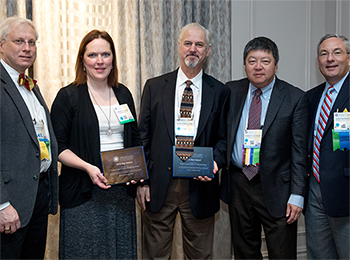 |
|
2016 STAR AWARD. From left to right: Steven C. Thornquist, MD, Academy associate secretary for State Affairs, Jennifer Keeler, executive director, Pennsylvania Academy of Ophthalmology (PAO); David M. Armesto, MD, PAO councilor; Kenneth P. Cheng, MD, PAO secretary of legislation and representation; and Kurt F. Heitman, MD, Academy secretary for State Affairs.
|
Congratulations to Life Fellows/Members
The Academy is pleased to congratulate members who have achieved the status of Life Fellow/Member in 2017. We commend them for their dedication to lifelong learning and advancing standards of care over their 35 years of membership. We deeply appreciate their loyalty and long-standing support.
View the list of Life Fellows/Members.
MEETING MATTERS
Archived Virtual Meeting Sessions From AAO 2016
The AAO Virtual Meeting, a free online component of AAO 2016, contains approximately 20 hours of educational content from 12 sessions that were streamed live from Chicago. It is available for viewing through Jan. 19, 2017. The 2016 AAO Virtual Meeting is not eligible for CME credit.
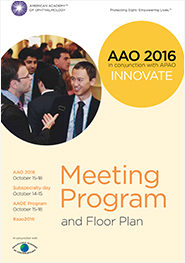 For more information, visit aao.org/virtual-meeting.
For more information, visit aao.org/virtual-meeting.
Enjoy AAO 2016 Meeting Content
Be sure to check out AAO Meetings on Demand to view cutting-edge information presented during AAO 2016 symposia, Subspecialty Day sessions, and AAOE programs. Watch the videos on your own schedule on your PC, Mac, or mobile device. Choose from the following options: highlights from 8 subspecialty meetings, the AAOE Program, or AAO 2016. Or purchase the package that includes all 3 options. AAO 2016 Meetings on Demand is not eligible for CME credit.
For more information and to order, visit aao.org/store.
AAO 2016 Meeting Archives
Visit the Meeting Archives to download course handouts, find scientific posters, read course abstracts, watch Videos on Demand, view syllabi from Subspecialty Day, check out AAO TV, and more. You can also find listings of Best Original Papers and Fan Favorite Video winners.
For more information, visit aao.org/aao-archives.
2017 Abstract Deadlines
To present at AAO 2017, you must submit abstracts online. The abstract submitter for instruction courses and new Skills Transfer labs closes Jan. 10. The abstract submitter for papers/posters and videos is open March 9 to April 11.
To submit, visit aao.org/presentercentral.
D.C. REPORT
Physicians Begin New Medicare Payment Program With Flexibility
This month, the Centers for Medicare & Medicaid Services (CMS) begins the transition to a new payment system that emphasizes quality of care over volume of services: the Quality Payment Program. For months, the Academy has been pushing to ensure that ophthalmologists avoid being penalized as they move to the new system. As a result, CMS has decided to give physicians extra flexibility in the Merit-based Incentive Payment System (MIPS) during 2017.
A softer landing. The increased flexibility lets clinicians avoid penalties by reporting on a single quality measure or improvement activity. Clinicians who want to earn a bonus can qualify by reporting on multiple measures for any 90-day period in 2017. The Academy pressed for this flexibility in order to enable all ophthalmologists, including those in small practices, to avoid the 4% financial penalty.
To learn more, see “Guide to MIPS 2017, Part 1: Know the Basics” as well as aao.org/medicare.